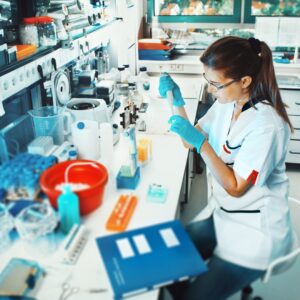
Working diligently behind the scenes at hospitals and clinics across the United States are medical laboratory technologists—allied health clinicians that use sophisticated technology to test and analyze patient samples and identify disease and illness. The temporary allied health staffing market has grown tremendously in the past five years, growing by 8% in 2023, according to Staffing Industry Analysts (SIA), meaning that now is one of the best times to trade in your permanent position for the travel healthcare lifestyle. In this blog, we’re discussing everything you need to know about medical laboratory technologist and technician jobs in 2024, and why you should partner with Barton Healthcare Staffing to find your next travel assignment.
What is a medical laboratory technologist?
A medical laboratory technologist, also known as a clinical laboratory technologist or a medical laboratory scientist, is an allied health clinician who performs complex laboratory tests to diagnose and monitor various diseases, conditions, and illnesses. There are a few different kinds of medical laboratory technologists:
- Cytotechnologists: Laboratory professionals who analyze patient cell samples to detect cancer and other diseases.
- Histotechnologists: Laboratory professionals who analyze patient tissue samples to detect cancer and other diseases.
- Medical Lab Scientists: Laboratory professionals with more education and clinical experience than medical lab technicians who test and analyze patient blood, bodily fluids, and tissue to detect disease.
What is a medical laboratory technician?
Medical laboratory technicians, also known as clinical laboratory technicians, have similar job responsibilities to that of a medical laboratory technologist, however they are often more junior roles with fewer educational requirements.
Like technologists, these clinicians test and analyze patient blood, bodily fluids, and tissue to detect disease. They typically have an associates degree and work under the supervision of medical laboratory scientists.
Medical Laboratory Technologist and Technician Job Outlook
In general, the job outlook for clinical laboratory technologists and technicians—also known as medical laboratory technologists and technicians—is strong. According to the U.S. Bureau of Labor Statistics (BLS), employment of these is projected to grow 5% from 2022 to 2032, which is faster than the average for all other occupations.
In fact, employment for these critical allied health professionals is projected to grow from 342,900 in 2022 to 359,700 in 2032, with about 24,000 openings for these professionals opening each year across the decade on average.
How much do medical laboratory technologists and technicians make?
According to the BLS, the median annual wage for clinical laboratory technologists and technicians was $60,780. The highest 10% of these professionals earned more than $93,900.
Travel medical laboratory technologists and technicians often make much more than those in permanent positions. Barton Healthcare Staffing estimates that by taking on the travel lifestyle, medical laboratory technologists and technicians could make more than those on staff salaries:
- Cytotechnologists: 78.8% more
- Medical Lab Technicians: 149% more
- Histotechnologists: 14.7% more
- Medical Lab Scientists: 87.7% more
How to Become a Medical Laboratory Technologist
Becoming a medical laboratory technologist is an exciting career path for those interested in healthcare and laboratory science. Here’s a step-by-step guide to help you pursue this profession:
- Complete your education: Earn a bachelor’s degree in medical laboratory science or a related field
- Gain hands-on experience: Participate in clinical rotations during your studies
- Obtain certification: Pass the American Society for Clinical Pathology (ASCP) Board of Certification exam
- Secure state licensure: Check your state’s requirements, as some states require licensure for medical laboratory technologists
How to Become a Medical Laboratory Technician
If you’re interested in a career as a medical laboratory technician, follow these steps to achieve your goal:
- Complete your education: Earn an associate’s degree in clinical laboratory science or a related field
- Gain practical experience: Participate in clinical practicums as part of your educational program
- Obtain certification: Pass the ASCP Board of Certification exam for medical laboratory technicians
- Secure state licensure (if required): Research your state’s requirements for medical laboratory technicians
Why become a travel medical laboratory technologist or technician?
As mentioned previously, the temporary allied health staffing market has seen significant growth in the past few years, making it one of the best times for medical laboratory technologists and technicians to take on travel assignments.
Becoming an travel medical laboratory technologist or technician with Barton Healthcare Staffing offers several advantages over permanent roles, including:
- Increased compensation
- More flexible scheduling options
- Opportunities to work in different locations across the country
- Exposure to diverse practice settings
- Support with licensing and credentialing processes
- Assistance arranging travel and accommodations
Typical travel allied health assignments last around 13 weeks, though shorter and longer options are available to suit individual preferences. When you partner with Barton Healthcare Staffing, you’ll work with a dedicated recruiter who will understand your unique needs and career goals to match you with suitable assignments that align with your lifestyle.
Find Your Next Travel Medical Technologist Job with BHS
Want to take the plunge into the travel allied health lifestyle? Reach out to one of our recruiters today, or apply to one of our many open positions on our job board.